NSPORT )(PRESS
Page 47
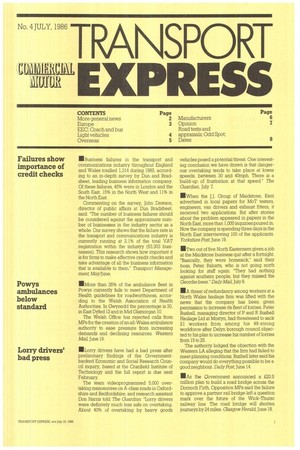
Page 48
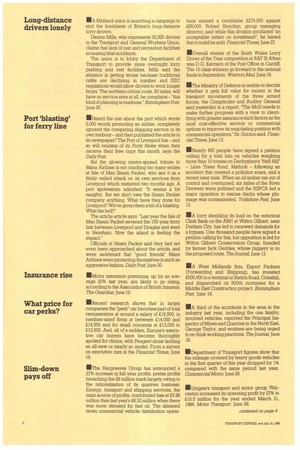
Page 49
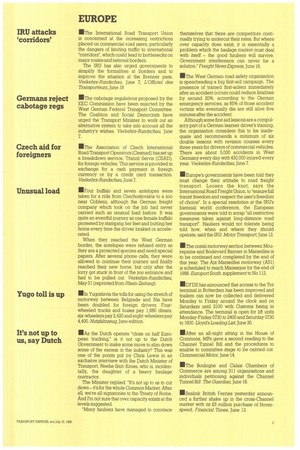
Page 50
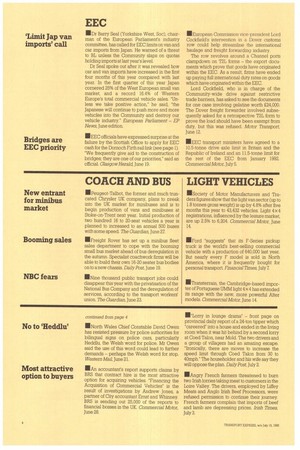
Page 51
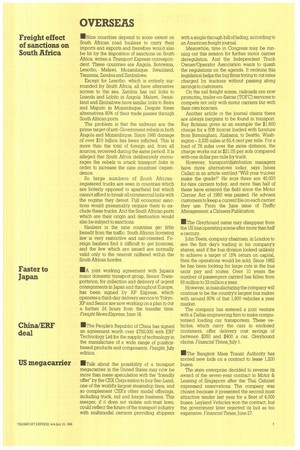
If you've noticed an error in this article please click here to report it so we can fix it.
▪ Business failures in the transport and communications industry throughout England and Wales totalled 1,314 during 1985, according to an in-depth survey by Dun and Bradsheet, leading business information company. Of these failures, 45% were in London and the South East, 15% in the North West and 11% in the North East.
Commenting on the survey, John Dawson, director of public affairs at Dun Bradsheet, said: "The number of business failures should be considered against the approximate number of businesses in the industry sector as a whole. Our survey shows that the failure rate in the transport and communications industry is currently running at 2.1% of the total VAT registration within the industry (63,303 businesses). This research shows how important it is for firms to make effective credit checks and take advantage of all the business information that is available to them." Transport Management, May/June.
III More than 35% of the ambulance fleet in Powys currently fails to meet Department of Health guidelines for roadworthiness, according to the Welsh Association of Health Authorities. In Gwynedd the percentage is 30, in East Dyfed 12 and in Mid Glamorgan 10.
The Welsh Office has rejected calls from MPs for the creation of an all-Wales ambulance authority to ease pressure from increasing demands and declining resources. Western Mail, June 19.
• Lorry drivers have had a bad press after preliminary findings of the Governmentbacked Economic and Social Research Council inquiry, based at the Cranfield Institute of Technology and the full report is due next February.
The team videoprogrammed 5,000 overtaking manoeuvres on A-class roads in Oxfordshire and Bedfordshire, and research assistant Don Harris told The Guardian: "Lorry drivers were definitely much less safe on overtaking. About 40% of overtaking by heavy goods vehicles posed a potential threat. One interesting conclusion we have drawn is that dangerous overtaking tends to take place at lower speeds, between 30 and 40mph. There is a build-up of frustration at that speed." The Guardian, July 7.
▪ When the J. J. Group of Maidstone, Kent advertised in local papers for MoT testers, engineers, van drivers and exhaust fitters, it received two applications. But after stories about the problem appeared in papers in the North East, more than 1,000 inquiries poured in. Now the company is spending three days in the North East interviewing 100 of the applicants. Yorkshire Post, June 19.
1111 Two out of five North Easterners given a job at the Maidstone business quit after a fortnight. "Basically, they were homesick," said their boss, Peter Rabatts, who is not going north looking for staff again. "They had nothing against southern people, but they missed the Geordie beer." Daily Mail, July 8.
N A threat of redundancy among workers at a North Wales haulage firm was lifted with the news that the company has been given permission to increase its fleet of lorries. Peter Bushell, managing director of P and R Bushell Haulage Ltd at Mostyn, had threatened to sack 21 workers from among his 48-strong worlcforce after Delyn borough council objected to his plan to increase his number of lorries from 15 to 25.
The authority lodged the objection with the Western LA alleging that the firm had failed to meet planning conditions. Bushell later said his company would do everything possible to be a good neighbour. Daily Post, June 14.
IlAs the Government announced a £20.5 million plan to build a road bridge across the Dornoch Firth, Opposition MPs said the failure to approve a partner rail bridge left a question mark over the future of the Wick-Thurso railway line. The road bridge will shorten journeys by 24 miles. Glasgow Herald, June 18. Long-distance MA Midland union is launching a campaign to end the loneliness of Britain's long-distance lorry drivers. Dennis Mills, who represents 30,000 drivers in the Transport and General Workers Union, claims that lack of rest and recreation facilities is causing fatal accidents. The union is to lobby the Department of Transport to provide more overnight lorry parking and rest facilities. Mills said the situation is getting worse because traditional cafés are declining in number and EEC regulations would allow drivers to work longer hours The northern orbital route, 60 miles. will have no service area at all, he complains "this kind of planning is madness.' Birmingham Post, June 30.
II Heard the one about the port which wrote 2,000 words promoting an airline, completely ignored the competing shipping service in its own harbour and then published the article in its newspaper? The Port of Liverpool has and so will readers of its Ports News when they receive their free copy this month, says the Daily Post. But the glowing centre-spread tribute to Manx Airlines is not cracking too many smiles at Isle of Man Steam Packet, who see it as a thinly veiled attack on its own services from Liverpool which restarted two months ago. A port spokesman admitted: "It seems a bit naughty. But we don't owe the Steam Packet company anything. What have they done for Liverpool? We've given them a bit of a blasting. What the hell?"
The article article says: "Last year the Isle of Man Steam Packet severed the 155-year ferry link between Liverpool and Douglas and went to Heysham. Now the island is feeling the impact." Officials at Steam Packet said they had not even been approached about the article, and were saddened that 'good friends" Manx Airlines were promoting themselves in such an aggressive fashion. Daily Post, June 30.
Insurance rise 11111Motor insurance premiums, up by an ave rage 20% last year, are likely to go rising, according to the Association of British Insurers. The Guardian, June 19.
IN Recent research shows that in larger companies the "perk' car becomes part of total remuneration at around a salary of £16,500; in medium-sized firms at between £14,000 and £14,500 and for small concerns at £13,000 to £13,500. And, all of a sudden, Europe's executive car buyers have become thoroughly spoiled for choice, with Peugeot alone lacking an all-new or nearly so model. From a survey on executive cars in the Financial Times, June 19.
• The Hargreaves Group has announced a 27% increase in full-year profits, pretax profits breaching the £9 million mark largely owing to the rationalisation of its quarries business. Energy, transport and shipping services, the main source of profits, contributed less at £5.98 million than last year's £6.33 million when there was more demand for fuel oil. The slimmed down commercial vehicle distribution opera tions earned a creditable £274,000 against £69,000. Robert Strachan, group managing director, said while this division produced "an acceptable return on investment", he hinted that it could be sold. Financial Times, June 27.
11110verall winner of the South Wales Lorry Driver of the Year competition at RAF St Athan was D.G. Kerrison of the Post Office in Cardiff. The 10 class winners go forward to the national finals in September. West9rn Mail, June 16.
• The Ministry of Defence is unable to decide whether it gets full value for money in the transport movements of the three armed forces, the Comptroller and Auditor General said yesterday in a report. "The MoD needs to make further progress with a view to identifying with greater assurance such factors as the most cost-effective service or commercial options to improve its negotiating position with commercial operators," Sir Gordon said. Financial Times, June 13.
• Nearly 450 people have signed a petition calling for a total ban on vehicles weighing more than 10 tonnes on Derbyshire's "Hell Hill" Lime Trees Road, Matlock following an accident that created a pollution scare, and a recent near miss. When an oil tanker ran out of control and overturned, six miles of the River Derwent were polluted and the RSPCA led a major operation to rescue ducks whose plumage was contaminated. Yorkshire Post, June 13.
MA lorry shedding its load on the notorious Clink Bank on the A691 at Witton Gilbert, near Durham City, has led to renewed demands for a bypass. One thousand people have signed a petition calling for this, but opposition is led by Witton Gilbert Conservation Group, founded by farmer Jack Geddes, whose piggery is on the proposed route. The Journal, June 13.
MA West Midlands firm, Export Packers (Forwarding and Shipping), has invested £500,000 in a terminal at Station Road, Coleshill, and dispatched its 500th container for a Middle East Construction project Birmingham Post, June 16.
MA third of the accidents in the area in the industry last year, including the one fatality, involved vehicles, reported the Principal Inspector of Mines and Quarries in the North East, George Taylor, and workers are being urged to re-think working practices. The Journal, June 18.
MI Department of Transport figures show that the mileage covered by heavy goods vehicles in the first quarter of this year dropped by I% compared with the same period last year. Commercial Motor, June 26.
• Unigate's transport and motor group Wincanton increased its operating profit by 27% to £10.5 million for the year ended March 31, 1986. Motor Transport, June 26. MI The International Road Transport Union is concerned at the increasing restrictions placed on commercial road users, particularly the dangers of limiting traffic to international "corridors", which could lead to bottlenecks on major routes and national borders.
The IRU has also urged governments to simplify the formalities at borders and to improve the situation at the Brenner pass. Verkehrs-Rundschau, June 7; L'Officiel des Transporteurs, June 19.
• The cabotage regulations proposed by the EEC Commission have been rejected by the West German Federal Transport Committee. The Coalition and Social Democrats have urged the Transport Minister to work out an alternative system to take into account all the industry's wishes. Verkehrs-Rundschau, June 7.
II1The Association of Czech International Road Transport Operators (Cesmad) has set up a breakdown service, Tranzit Servis (CSAD), for foreign vehicles. This service is provided in exchange for a cash payment in foreign currency or by a credit card transaction Verkehrs-Rundschau, June 7.
MI Four buffalo and seven antelopes were taken for a ride from Czechoslovakia to a zoo near Coblenz, although the German freight company which took on the job had never carried such an unusual load before. It was quite an eventful journey as one female buffalo protested by stamping her feet and butting her horns every time the driver braked or accelerated.
When they reached the West German border, the antelopes were refused entry as they are a protected species and need special papers. After several phone calls, they were allowed to continue their journey and finally reached their new home, but only after the lorry got stuck in front of the zoo entrance and had to be pulled out. Verkehrs-Runcischau, May 31 (reprinted from Rhein-Zeitung).
NI In Yugoslavia the tolls for using the stretch of motorway between Belgrade and Nis have been doubled for foreign drivers. Fourwheeled trucks and buses pay 1,680 dinars, six-wheelers pay 2,420 and eight-wheelers pay 4,400. Nutzfahrzeug, June edition, IRAs the Dutch operate "close on half European trucking," is it not up to the Dutch Government to make some move to slim down some of the excess in the industry? This was one of the points put by Chris Lewis in an exclusive interview with the Dutch Minister of Transport, Neelie Smit-Kroes, who is, incidentally, the daughter of a heavy haulage contractor.
The Minister replied "It's not up to us to cut downit's for the whole Common Market. After all, we're all signatories to the Treaty of Rome. And I'm not sure that over capacity exists at the levels suggested.
"Many hauliers have managed to convince themselves that there are competitors continually trying to undercut their rates. But where over capacity does exist, it is essentially a problem which the haulage market must deal with itself the good hauliers will survive. Government interference can never be a solution," Freight News Express, June 16.
Mlle West German road safety organisation is spearheading a big first-aid campaign. The presence of trained first-alders immediately after an accident occurs could reduce fatalities by around 20%, according to the German emergency services, as 85% of those accident victims who eventually die are still alive five minutes after the accident Although some first aid lessons are a compulsory part of a German learner driver's training, the organisation considers this to be inadequate and recommends a minimum of six double lessons with revision courses every three years for drivers of commercial vehicles. There are about 5,000 accidents in West Germany every day with 430,000 injured every year. Verkehrs-Rundschau, June 7.
1Europe's governments have been told they must change their attitude to road freight transport. Loosen the knot, says the International Road Freight Union, to "ensure full transit freedom and respect the user's freedom of choice". In a special resolution at the IRU's biennial world conference, the European governments were told to scrap "all restrictive measures taken against long-distance road transport". Hauliers would not tolerate being told how, when and where they should operate, said the IRU. Motor Transport, June 12.
• The costal motorway section between Mourepaine and Boulevard Barnier in Marseilles is to be continued and completed by the end of this year. The Aix-Marseilles motorway (A51) is scheduled to reach is/lanesque by the end of 1986. E'uroport South, supplement to No 112.
• DFDS has announced that access to the Tor terminal in Rotterdam has been improved and trailers can now be collected and delivered Monday to Friday around the clock and on Saturdays until 2100 with Customs being in attendance. The terminal is open for lift units Monday-Friday 0730 to 2400 and Saturday 0730 to 1600. Lloyd's Loading List, June 30.
• After an all-night sitting in the House of Commons, MPs gave a second reading to the Channel Tunnel Bill and the procedures to enable to committee stage to be carried out. Commercial Motor, June 14.
N I The Boulogne and Calais Chambers of Commerce are among 311 organisations and individuals petitioning against the Channel Tunnel Bill. The Guardian, June 18.
• Sealink British Ferries yesterday announced a further shake up in the cross-Channel market with its £5 million purchase of Hoverspeed. Financial Times, June 13.
liDr Barry Seal (Yorkshire West, Soc), chairman of the European Parliament's industry committee, has called for EEC limits on van and car imports from Japan. He warned of a threat to BL unless the Community slaps on quotas holding imports at last year's level.
Dr Seal spoke out after it was revealed how car and van imports have increased in the first four months of this year compared with last year. In the first quarter of this year Japan cornered 25% of the West European small van market, and a record 16.4% of Western Europe's total commercial vehicle sales. "Unless we take positive action," he said, "the Japanese will continue to push more and more vehicles into the Community and destroy our vehicle industry." European Parliament EP News, June edition.
MEEC officials have expressed surprise at the failure by the Scottish Office to apply for EEC cash for the Dornoch Firth rail link (see page 1). "We frequently give aid to the construction of bridges; they are one of our priorities," said an official. Glasgow Herald, June 19.
III European Commission vice president Lord Cocicfield's intervention in a Dover customs row could help streamline the international haulage and freight forwarding industry.
The row revolves around a Channel ports clampdown on T2L forms the export documents which prove that goods have originated within the EEC. As a result, firms have ended up paying full international duty rates on goods which have originated within the EEC.
Lord Cockfield, who is in charge of the Community-wide drive against restrictive trade barriers, has asked to see the documents for one case involving gelatine worth £24,000. The Dover freight forwarder involved subsequently asked for a retrospective T2L form to prove the load should have been exempt from duty, but this was refused. Motor Transport, June 12.
"'EEC transport ministers have agreed to a 10.5-tonne drive axle limit in Britain and the Republic of Ireland and an 11.5-tonne limit for the rest of the EEC from January 1992. Commercial Motor, July 5.
▪ North Wales Chief Constable David Owen has resisted pressure by police authorities for bilingual signs on police cars, particularly Heddlu, the Welsh word for police. Mr Owen said the use of this word could lead to further demands perhaps the Welsh word for stop. Western Mail, June 21.
illAn accountant's report supports claims by BRS that contract hire is the most attractive option for acquiring vehicles. "Financing the Acquisition of Commercial Vehicles" is the result of investigations by Andrew Jones, a partner of City accountant Ernst and Whinney. BRS is sending out 25,000 of the reports to financial bosses in the UK. Commercial Motor, June 28. MI"Lorry in lounge drama" front page on provincial daily report of a 24-ton tipper which "careered" into a house and ended in the living room when it was hit behind by a second lorry at Coed Talon, near Mold. The two drivers and a group of villagers had an amazing escape. "Ironically, there are moves to increase the speed limit through Coed Talon from 30 to 40mph." The householder and his wife say they will oppose the plan. Daily Post, July 2.
El Angry French farmers threatened to burn two Irish lorries taking meat to customers in the Loire Valley. The drivers, employed by Liffey Meats and Anglo Irish Beef Processors, were refused permission to continue their journey. French farmers complain that imports of beef and lamb are depressing prices. Irish Times, July 3. E Nine countries depend to some extent on South African road hauliers to carry their imports and exports and therefore would also be hit by the imposition of sanctions on South Africa, writes a Transport Express correspondent. These countries are Angola, Botswana, Lesotho, Malawi, Mozambique, Swaziland, Tanzania, Zambia and Zimbabwe.
Except for Lesotho, which is entirely surrounded by South Africa, all have alternative access to the sea. Zambia has rail links to Luanda and Lobito in Angola, Malawi, Swaziland and Zimbabwe have similar links to Beira and Maputo in Mozambique. Despite these alternatives 80% of their trade passes through South African ports.
The problem is that the railways are the prime target of anti-Government rebels in both Angola and Mozambique. Since 1980 damage of over $10 billion has been inflicted. This is more than the total of foreign aid, from all sources, received during the same period. It is alleged that South Africa deliberately encourages the rebels to attack transport links in order to increase the nine countries' dependence, So large numbers of South Africanregistered trucks are seen in countries which are bitterly opposed to apartheid but which cannot afford to break all commercial links with the regime they detest. Full economic sanctions would presumably require them to exclude these trucks. And the South African ports which are their origin and destination would also be subject to sanctions.
Hauliers in the nine countries ge-. little benefit from the traffic. South African licensing law is very restrictive and rail-oriented. Foreign hauliers find it difficult to get licences, and the few which are issued are normally valid only to the nearest railhead within the South African border.
▪ joint working agreement with Japan's major domestic transport group, Senior Transportation, for collection and delivery of urgent consignments in Japan and throughout Europe, has been signed by XP Express, which operates a third-day delivery service to Tokyo. XP and Senior are now working on a plan to cut a further 24 hours from the transfer time. Freight News Express, June 16.
E The People's Republic of China has signed an agreement worth over £750,000 with ERF Technology Ltd for the supply of technology in the manufacture of a wide range of plasticsbased products and components, Freight, July edition.
"'Talk about the possibility of a transport megacarrier in the United States may now be more than mere speculation with the "friendly offer" by the CSX Corporation to buy Sea-Land, one of the world's largest steamship lines, and so complement CSX's other modal offerings, including truck, rail and barge business. This merger, if it does not violate anti-trust laws, could reflect the future of the transport industry with multimodal carriers providing shippers with a single through bill of lading, according to an American freight journal.
Meanwhile, time in Congress may be running out this session for further motor earner deregulation And the Independent Truck Owner/Operator Association wants to quash the regulations on the agenda. It reckons this legislation helps the big firms trying to cut rates charged by truckers without passing along savings to customers.
On the rail freight scene, railroads are now promotina trailer-on-flatcar (TOFC) services to compete not only with motor carriers but with their own boxcars.
Another article in the journal claims there are always bargains to be found in transport, Ray Bohman gives as an example the $1,600 charge for a 50ft boxcar loaded with furniture from Birmingham, Alabama, to Seattle, Washington —2,525 miles at 63.4 cent per mile. For a load of 76 sofas over the same distance, the charge works out at $2105 per sofa compared with one dollar per mile by truck.
However, transport/distribution managers have more alternatives today, says James Callari in an article entitled "Will your trucker make the grade?" He says there are 40,000 for-hire carriers today, and more than half of these have entered the field since the Motor Carrier Act of 1980 was passed. He advises customers to keep a current file on each carrier they use. From the June issue of Traffic Management, a Cahners Publication EThe Greyhound name may disappear from the US bus operating scene after more than half a century.
John Teets, company chairman, in London to see the first day's trading in his company's shares, said if the bus division looked unlikely to achieve a target of 15% return on capital, then the operations would be sold. Since 1982 he has been looking for large cuts in the bus units pay and routes. Over 10 years the number of passengers carried has fallen from 68 million to 33 million a year.
However, in manufacturing the company will continue to be the country's largest bus maker with around 80% of that 1,800 vehicles a year market.
The company has entered a joint venture with a Dallas engineering firm to make computerised loading car transporters. These vehicles, which carry the cars in enclosed containers, offer delivery cost savings of between $350 and $400 a car, Greyhound claims. Financial Times, July 1.
IN The Bangkok Mass Transit Authority has invited new bids on a contract to lease 1,200 buses.
The state enterprise decided to reverse its award of the seven-year contract to Motor & Leasing of Singapore after the Thai Cabinet expressed reservations. The company was chosen because it presented the second most attractive tender last year for a fleet of 4,000 buses. Leyland Vehicles won the contract, but the government later rejected its bid as too expensive. Financial Times, June 27.




































































































